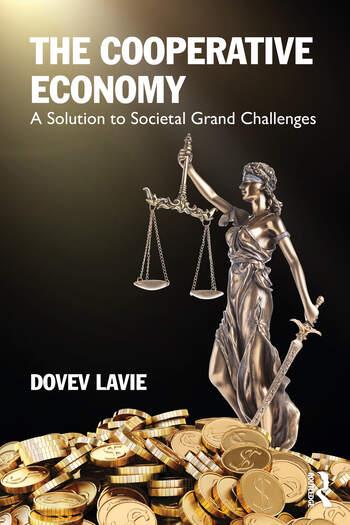
Un sistema economico prosociale e' necessario e possibile
LA DISUGUAGLIANZA ECONOMICA, IL CONSUMO ECCESSIVO DI RISORSE, IL DOMINIO DELLE PIATTAFORME E LA PERDITA DI PRIVACY SONO PREOCCUPAZIONI DIFFUSE. DOVEV LAVIE NE RICERCA LE CAUSE E LE POSSIBILI SOLUZIONI Le grandi sfide della società si ripercuotono sull'umanità, che si trova a un bivio. La concentrazione della ricchezza e la disuguaglianza economica, il dominio delle Big Tech, la perdita della privacy e della libertà di scelta, il consumo eccessivo e lo sfruttamento eccessivo delle risorse naturali sono stati amplificati dalla globalizzazione. Le regolamentazioni, la legislazione, i trattati internazionali e le politiche pubbliche e aziendali non sono state in grado di offrire rimedi sufficienti. Nel suo recente libro, The Cooperative Economy: A Solution to Societal Grand Challenges (Routledge), Dovev Lavie (Dipartimento di Management e Tecnologia dell'Università Bocconi) individua la causa principale di questi problemi e propone una soluzione coraggiosa: un nuovo sistema economico, libero dai difetti di progettazione che hanno contribuito a queste grandi sfide sociali. L'economia cooperativa proposta è un sistema di scambio etico guidato dalla comunità che si basa sull'azione collettiva per promuovere i valori della società tenendo conto dei vincoli delle risorse. A differenza del sistema economico moderno, guidato prevalentemente da comportamenti opportunistici, l'economia cooperativa si allontana da un orientamento materialistico e segue una prospettiva più equilibrata che fa leva sul comportamento prosociale. Il libro spiega come questo nuovo sistema adotti principi di progettazione che promuovono l'autosufficienza delle comunità, la sostenibilità e l'imprenditorialità, limitando al contempo il consumo eccessivo e l'eccessivo profitto. Il libro descrive come il sistema serva gli interessi di consumatori, venditori e dipendenti, impedendo al contempo l'accumulo di potere da parte del proprietario della piattaforma che gestisce il sistema. Bocconi Knowledge, per gentile concessione dell'autore e dell'editore, pubblica un estratto del libro.
Le grandi sfide della società si ripercuotono sull'umanità, che si trova a un bivio. La concentrazione della ricchezza e la disuguaglianza economica, il dominio delle Big Tech, la perdita della privacy e della libertà di scelta, il consumo eccessivo e lo sfruttamento eccessivo delle risorse naturali sono stati amplificati dalla globalizzazione. Le regolamentazioni, la legislazione, i trattati internazionali e le politiche pubbliche e aziendali non sono state in grado di offrire rimedi sufficienti. Nel suo recente libro, The Cooperative Economy: A Solution to Societal Grand Challenges (Routledge), Dovev Lavie (Dipartimento di Management e Tecnologia dell'Università Bocconi) individua la causa principale di questi problemi e propone una soluzione coraggiosa: un nuovo sistema economico, libero dai difetti di progettazione che hanno contribuito a queste grandi sfide sociali. L'economia cooperativa proposta è un sistema di scambio etico guidato dalla comunità che si basa sull'azione collettiva per promuovere i valori della società tenendo conto dei vincoli delle risorse. A differenza del sistema economico moderno, guidato prevalentemente da comportamenti opportunistici, l'economia cooperativa si allontana da un orientamento materialistico e segue una prospettiva più equilibrata che fa leva sul comportamento prosociale. Il libro spiega come questo nuovo sistema adotti principi di progettazione che promuovono l'autosufficienza delle comunità, la sostenibilità e l'imprenditorialità, limitando al contempo il consumo eccessivo e l'eccessivo profitto. Il libro descrive come il sistema serva gli interessi di consumatori, venditori e dipendenti, impedendo al contempo l'accumulo di potere da parte del proprietario della piattaforma che gestisce il sistema. Bocconi Knowledge, per gentile concessione dell'autore e dell'editore, pubblica un estratto del libro.“The dominant doctrine has suggested that the primary social responsibility of firms is to increase profits and maximize shareholder value…These firms have grown, expanded, and conquered traditional industries with their emerging technologies, innovative business models, and dominant platform ecosystems, honing this effective and efficient economic machine to perfection. Firms such as Google, Amazon, Meta, Apple, Netflix, Uber, and Airbnb have become household names, and many consumers cannot imagine their lives without them. By leveraging their network externalities and winner-takes-all positions in their respective domains, such leading firms have left little room for contenders…The “Big Tech” congressional antitrust hearings by the US House Judiciary Antitrust Subcommittee, and investigations of worldwide practices by regulators and agencies such as the Justice Department and the Federal Trade Commission, have scrutinized the anticompetitive practices of Amazon, Apple, Meta, and Google, paying increasing attention to the negative implications of their dominance in such domains as e-commerce, social media, app stores, and online search…The above concerns supplement complaints about firms exploiting natural resources and harming environmental sustainability. Overall, these concerns suggest that the established economic system that has guided corporate and consumer behaviors may suffer from some flaws. Certain firms have thrived and prospered, but the question is: at what societal cost?...Corporate greed and wealth concentration have continued to accelerate during the Covid-19 pandemic, when one would have expected greater solidarity with humankind. Economic inequality and social divide have become more pervasive at a time that calls for compassion and mutual aid. For example, according to Oxfam, in the first six months of 2020 an estimated 400 million jobs were lost and 500 million people became impoverished. Not surprisingly, vulnerable communities such as minorities and immigrants suffered the most. In contrast, the 32 most profitable firms in the world increased their profits by $109 billion relative to their average annual figures in the previous four years. While 94 percent of these firms’ profits were distributed to their wealthy shareholders, less than 0.5 percent of their profits were donated to address the ramifications of the Covid-19 pandemic. It seems, then, that firms’ contributions to society have mostly benefited themselves.
Where have we been going wrong? Before attempting to answer this question and offer a remedy, let us delve deeper and gain a better understanding of some of the faults of the current economic system and their roots. Note that my purpose here is neither to offer a balanced perspective that acknowledges the many merits of the economic system nor relate every disaster to a faulty design of that system. Rather, I wish to highlight some well-known challenges that can be ascribed, at least in part, to the principles of economic exchange and to the industrious pursuit of value creation and capture. These challenges include wealth concentration and economic inequality, the grip of ecosystem platform owners, loss of privacy and private choice, overconsumption and abuse of natural resources, and some drawbacks of globalization that reinforce the former caveats.”
di Dovev Lavie
